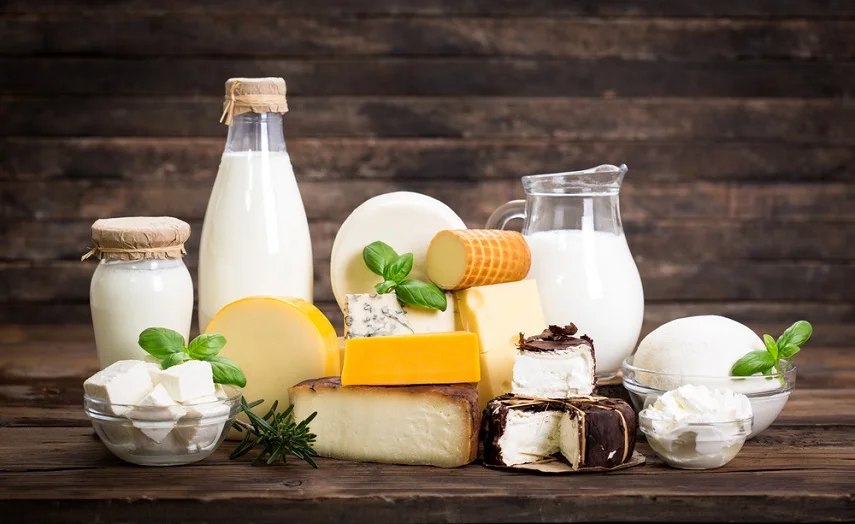Top 10 High Calcium Foods You Should Know
Calcium is an important element that our bodies need to do many things, but its main job is to build and keep strong bones and teeth. It's very important to eat enough calcium-rich foods to keep our bones healthy and to help our bodies do other important things. In this blog, we'll talk about a wide range of foods that are good sources of calcium. This will help you make better food choices.
Calcium is a key part of keeping our bones healthy for the rest of our lives. It helps bones grow and develop during childhood and puberty, and it stops the bone loss that comes with getting older. Calcium also helps muscles clench, nerves work, blood clots, and hormones work as they should. If you don't get enough calcium, you could get osteoporosis, which makes your bones weak and brittle. So, it's important to eat enough calcium rich foods.
Dairy Products

When we think of calcium, dairy items are the first thing that come to mind. Milk, cheese, and yogurt are all good sources of calcium. About 300 mg of calcium can be found in one cup of milk, while about 200 mg can be found in one dish of cheese or yogurt. But it's important to remember that not everyone likes or can handle dairy products, so it's important to look into other choices.
Leafy Green Vegetables

Leafy greens are a great way to get calcium, which makes them a great choice for vegans, people who can't eat dairy, or people who just prefer plant-based foods. Kale, broccoli, collard greens, and bok choy are all vegetables that are not only rich in calcium but also have other health benefits. For example, one cup of cooked kale has about 100 mg of calcium, along with other nutrients like vitamin K and fiber.
Seafood

People who like seafood have another reason to be happy: many kinds of fish are great sources of calcium. With their edible bones, the bones of canned salmon, sardines, and anchovies are a good source of this essential vitamin. Up to 180 mg of calcium can be found in a 3-ounce dose of canned salmon. Seafood also has omega-3 fatty acids, which are good for the health of your heart.
Legumes and Pulses

Legumes and pulses are healthy foods that can be used in many ways and are known for having a high protein content. They also give you a good amount of calcium and protein. Chickpeas, lentils, and kidney beans are full of both protein and calcium, which makes them great choices for people who eat only plant-based foods. About 80 mg of calcium can be found in half a cup of cooked chickpeas, along with fiber and other important minerals.
Nuts and Seeds

Nuts and seeds not only give our meals a nice taste, but they are also full of important nutrients, like calcium. In particular, almonds and sesame seeds are known for having a lot of calcium in them. About 75 mg of calcium can be found in just one ounce of almonds, which is about 23 nuts. A simple way to get more calcium is to eat a handful of nuts or sprinkle sesame seeds on soups or stir-fries.
Amaranth

Amaranth, an ancient grain with a nutty flavor, is often overlooked but deserves a place in your pantry. This gluten-free grain is not only a great source of fiber and protein but also contains a notable amount of calcium. A one-cup serving of cooked amaranth can provide around 150-200 mg of calcium. Incorporate amaranth into your meals as a delicious and nutritious alternative to other grains like rice or quinoa.
Whole Grains

Whole grains like oats, quinoa, and brown rice are not only rich in carbohydrates but also offer some calcium. These grains can be enjoyed as a side dish, in salads, or as a base for hearty meals. While their calcium content may not be as high as other sources, every little bit adds up to meet your daily calcium requirements.
Fruits

While fruits are not typically known for being significant sources of calcium, some varieties do contain small amounts. For example, oranges, figs, and blackberries have minimal calcium content. However, their nutritional value lies in their abundance of vitamins, minerals, and antioxidants, making them essential components of a well-rounded diet.
Starchy Vegetables

Starchy vegetables like sweet potatoes and butternut squash are nutrient-dense and provide a good amount of carbohydrates for energy. While their calcium content is not as high as other sources mentioned earlier, they still contribute to your overall calcium intake. Additionally, these vegetables offer a host of other essential nutrients and dietary fiber, supporting a healthy digestive system.
Dried Herbs

While herbs are typically known for adding flavor to dishes, they also offer surprising health benefits, including calcium content. Some dried herbs, such as basil, thyme, and dill, are relatively high in calcium compared to their fresh counterparts. While the exact calcium content varies, adding dried herbs to your meals can contribute to your overall calcium intake. Sprinkle them over salads, incorporate them into sauces, or use them as a seasoning for roasted vegetables to enhance both flavor and nutrition.
Conclusion
Incorporating calcium-rich foods into your diet is crucial for maintaining strong bones and supporting various bodily functions. While dairy products like milk, cheese, and yogurt are traditional sources of calcium, it's essential to consider alternative options for those who cannot or prefer not to consume dairy. Leafy green vegetables, seafood, legumes and pulses, nuts and seeds, and fortified foods are excellent alternatives that provide a good amount of calcium. Additionally, while high carb foods may not be the primary sources of calcium, they still play a role in a balanced diet by providing energy and other essential nutrients.
Remember, a diverse and balanced diet is key to obtaining all the necessary nutrients, including calcium. By incorporating a variety of these calcium-rich foods into your meals and snacks, you can ensure that you are meeting your calcium requirements and supporting your overall health and well-being.













